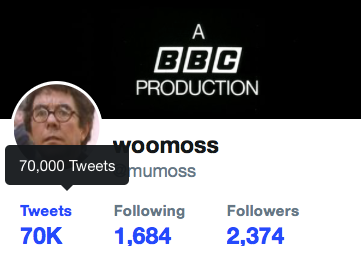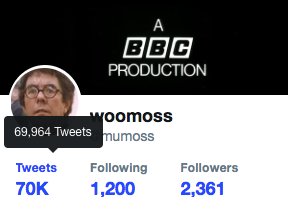Late last year, I took a month off Twitter.1 No fuss, no drama, no attention-seeking. Just a short tweet saying I’d be back soon, which I was. Among other things, sometimes the news agenda simply becomes a little too much in my feed; considering my job involves watching the news endlessly for a living, I consider the move practical, not ostrich-like. I get more than enough of that stuff elsewhere.
I did, however, use the time away to perform a little experiment, based on something I noticed the previous time I took a little break. When I disappeared, my tweet count was bang on 70,000 tweets. (A move that tells you an embarrassing amount about how my brain works.) But what was my tweet count when I returned?

26th October 2017

21st November 2017
69,964. A difference of 36 tweets. But why? I hadn’t deleted any myself. Surely I should have exactly the same number of tweets when I returned? Is Twitter just really bad at maths?
In order to find out, I downloaded an archive of my tweets just before I took my month’s break, and downloaded another archive when I returned, so I could compare the two and find out what was missing. You may think this was a ridiculous thing to do. I would say it is entirely consistent with the kind of person who decides to get to exactly 70,000 tweets before they take their planned break from Twitter.
The answer is perhaps obvious. None of the missing tweets were things I had posted myself; the missing tweets were retweets I had done of other people’s tweets, which the original poster had deleted in the month I spent away. Exactly what was deleted is many and varied, and gives a little insight into the shifting nature of Twitter.
Here are a few examples – shorn of any identifying information. (No usernames or direct quotes.)
- Most obviously, there was the tweets from accounts which routinely delete all their old tweets every month. I’ve always found this a little odd, but I’ve got an archivists brain, so what are you going to do?
- Then there was the tweets from the guy I’ve chatted to for years… who suddenly deleted their account in the time I was gone. I don’t know their real name, and don’t know if they had a website. They’ve just… gone. I’ll probably never talk to them again, and I have no idea who they were.
- There was the tweet from a famous ex-Nintendo employee who posted something insightful about how awful the tech world is… presumably deleted as she got harassed over it. People suck.
- Then there was the tweets from a political writer, who periodically deactivates and reactivates his account, making those tweets randomly disappear and reappear depending on his mood.
- There was the tweet from an ex-standup comedian, who’s since made his entire account private, meaning any RTs of his stuff suddenly disappear.
- There was the person I follow who seems to have deleted all the tweets they once made about a certain TV programme, but nothing else. (Nope, no idea why.)
- There was the person who made a really interesting point about a piece of special effects work in Doctor Who that I was complaining about. Meaning my initial moan is still online, but not his perfectly justified defence, as his account is now private.
- There was the person who make a reference to their PE teacher being a paedophile… and now their entire account is deleted. I’m not sure I want to work out exactly what happened there, but I suspect it’s nothing good.
- There was the person who tweeted a really funny joke about Douglas Carswell, which went viral… and they’ve now deleted seemingly just that single tweet. Which is odd.
- There was the Doctor Who celeb who tweeted something amusing about hats, who deactivated their whole account due to an INCIDENT. (Since reactivated.)
- There was the comedy writer who tweeted something touching about the death of David Nobbs… and has since deactivated his account, robbing us of his thoughts.
- There was the parody Teletubbies account which posted wildly inappropriate things… which got suspended by Twitter. Oh well.
- Also on the suspension list: the person who I only spoke to for a short period of time… but tweeted this link to me. I will always be eternally grateful.
* * *
I’ve got to be honest: when I figured out exactly what was happening above, I was a little… well, irritated. To wave away any initial reactions to this first: of course there are a million and one more important things to worry about. (Dirty Feed doesn’t usually tackle the most important topic in the room.) Please also note that I said irritated, not upset, or angry. Nor is my irritation to do with my nice round 70,000 figure being ruined… well, not entirely, anyway.
Moreover, in a world where nutjobs are going through people’s old tweets and trying to get them fired – and occasionally succeeding – perhaps the above can be seen as an actively good thing, and entirely correct Twitter behaviour. Twitter clearly doesn’t do enough to protect its users: to argue for the above behaviour to be changed may seem foolhardy at best.
So I’m not going to argue for that. I will, however, bring up a few arguments as to why the above behaviour might not be as definitively correct as it appears.
Firstly: Twitter includes retweets as part of your total tweet count. In other words, they see them as equal in importance to the stuff you write yourself. Users also clearly feel a certain sense of responsibility and ownership of the stuff they retweet: how many people use precious characters in their bio in order to clarify that “retweets are not endorsements”? Like it or not, when someone retweets you, your words become part of their Twitter account. Forgetting the harm issue for a moment: if something has been posted publicly on a service which allows other people to repost your words, do you have the right to retrospectively withdraw those words across the whole service, as the expense of an existing conversation which involves more than just you?
Secondly: there are, of course, plenty of examples where deleting tweets can protect people. But it’s also worth remembering that deleting tweets also erases bad behaviour which perhaps should be preserved. You don’t need me to give a list of examples of high-profile individuals or companies who have behaved absolutely appallingly on Twitter, and then hastily delete the evidence. Sure, it can survive in screengrabs and the like. But the deletion of tweets isn’t a one-way street just towards protecting people: the erasure of evidence can lead to harm, too. “I wish I’d seen that tweet of his that he deleted: I would have known to avoid that fucker.”
Thirdly: it’s worth remembering that the above isn’t the default behaviour of all social media services. This is very much not a fait accompli. To take a very high profile example: Tumblr doesn’t do it. If you reblog something from another Tumblr blog, and then the initial post is deleted, the original text of that post remains on your blog. Once you’ve posted something on Tumblr and someone decided to reblog it, you have entirely lost control of that content through normal means: you would have to get in touch with Tumblr to manually request its removal.
I cannot in all good conscience say that’s how Twitter should behave too. The hard line part of me wishes it did – I simply don’t like the idea that people can delete part of my Twitter archive without my permission. But Twitter already has an abuse problem, and while the above behaviour doesn’t seem to have caused a great deal of harm over on Tumblr (to my knowledge), I’m not stupid enough to think that a blanket change on Twitter couldn’t cause problems.
But at the back of my mind… it bugs me. Nobody gets to have part of Dirty Feed’s archive deleted without a proper due process. But you most certainly aren’t in control of anything you have retweeted on Twitter. Perhaps that’s ultimately a good thing. But if you care about your Twitter archive and see it as something that is more than just ephemeral2 – and I’m far from the only person who feels like this – it’s worth being aware of the compromises involved in that decision.
